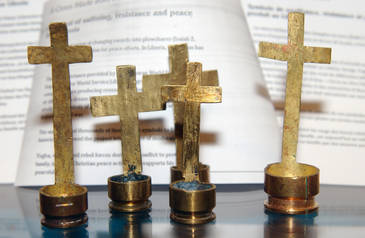Share Page
On our way towards an Arms Trade Treaty
 Metal crosses crafted in Liberia from cartridge shells following the country's civil war.
Metal crosses crafted in Liberia from cartridge shells following the country's civil war.Every day, somewhere in the world, 2,000 people die as a result of armed violence. The uncontrolled and irresponsible sale of, and trade in, small arms and light weapons fuels poverty and suffering. Additionally, the massive and ready supply of weapons makes them accessible for misuse and abuse.
Armed conflict, the displacement of people, organized crime and terrorism flourish in the absence of internationally agreed standards for the transfer of weapons across international borders, thus undermining peace, stability and socio-economic development.
Recognizing that fact, the General Assembly of the United Nations began the process to negotiate an Arms Trade Treaty (ATT) in January 2010 culminating in a treaty conference in July 2012. It seeks consensus on a legally binding treaty containing universal regulations enforcing the highest possible standards for the responsible trade of conventional weapons.
The idea is that if all UN member states agree on a set of standards as to what makes arms transfers acceptable, it will make the illicit trade or transfer of arms much more difficult.
The ATT will not affect national laws regarding the internal movement of arms, the right for citizens to bear arms or a country’s right to self-defence. However, the application of internationally agreed trading standards can prevent and reduce the use of weapons for purposes of human rights abuses, violations of humanitarian law, or to incite terror.
The churches' role
Churches, church members and related organizations support a treaty that will ultimately save lives and protect communities which current trade practices put at risk. In order to reduce unlawful armed violence such a treaty must be both strong and effective. An ATT that is strong will apply to all categories of conventional weapons. It will also reinforce existing obligations of states to protect life under international law and other international norms. An ATT that is effective will have provisions for reporting, transparency, accountability and enforcement that serve to protect communities, nations and regions affected by poorly regulated transfers of arms.
As grassroots-based structures working in communities, churches bear witness to the brutal consequences of armed violence and are often directly involved in ministry and care for people affected by this violence. The role of the churches should be to mobilize the communities as well as to bring the experiences and stories from the ground to the level of decision makers.
The churches are well placed to acknowledge and testify to the impact of small arms, since they minister to the victims and their families all around the world, in rich and poor nations. Churches see people's needs and are in a unique position to address the small arms epidemic, identifying its material, moral, ethical and spiritual dimensions. Churches can inform, mobilize, and guide the community, offering a specific and holistic contribution to the international small arms campaign. Churches also have a policy role to play, bringing theological insights and moral and ethical perspectives to bear upon the social and political pursuit of small arms control and demand reduction.
(Policy Framework and Guidelines on Small Arms and Light Weapons, WCC Commission of the Churches on International Affairs, May 2001)
Churches, church members and related organizations support a treaty that will ultimately save lives and protect communities which current trade practices put at risk. In order to reduce unlawful armed violence such a treaty must be both strong and effective. An ATT that is strong will apply to all categories of conventional weapons. It will also reinforce existing obligations of states to protect life under international law and other international norms. An ATT that is effective will have provisions for reporting, transparency, accountability and enforcement that serve to protect communities, nations and regions affected by poorly regulated transfers of arms.

